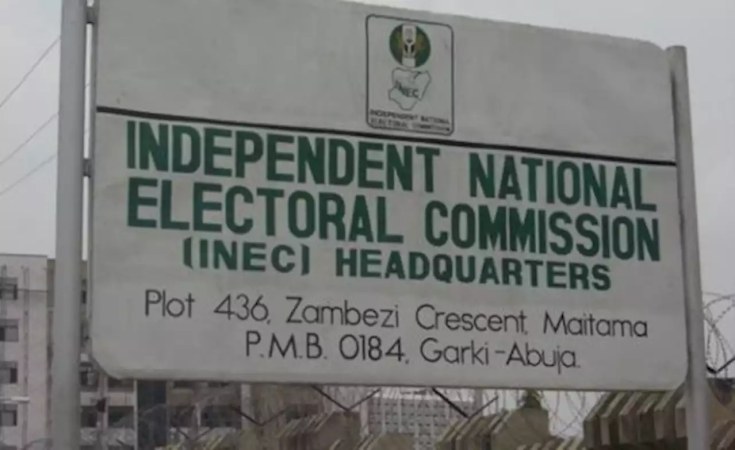The West African coalition, WADEMOS, identified issues that Nigeria needs to address ahead of its February and March elections and Sierra Leone and Liberia hold theirs later in 2023.
A regional coalition of pro-democracy civil society organisations has said Nigeria's general elections have implications for similar polls taking place in two West African countries within the year. The two other West African countries are Sierra Leone and Liberia.
The West Africa Democracy Solidarity Network (WADEMOS) said this on Friday during its four-day official visit to Nigeria. The coalition highlighted areas the country needed to improve on to achieve credible polls.
Nigeria holds its presidential and National Assembly elections on 25 February and governorship elections in various states on 11 March.
Sierra Leone queues behind Nigeria as it holds its own elections in June, while Liberia will follow suit in October.
Addressing journalists in Abuja, the Nigerian capital, on Friday, the leader of the WADEMOS delegation, Kojo Asante, said the Nigerian election "is particularly important for the entire sub-region as it sets the tone for subsequent elections in Sierra Leone (June 2023) and Liberia (October 2023)."
This, according to Mr Asante, necessitated the need to solidarize with civil society, especially the WADEMOS members in Nigeria, assess the level of preparedness of key electoral stakeholders towards the elections, and offer recommendations to key stakeholders for redress on challenges identified.
Mr Asante, who is the director, Advocacy and Policy Engagement, the Centre for Democracy and Development (CDD), Ghana, said his delegation met with "an array of stakeholders in Nigeria" during its visit between 24 and 28 January.
Those they met in Abuja included ECOWAS, the Independent National Electoral Commission (INEC), the National Human Rights Commission, the National Peace Committee, the Inter-party Advisory Council (IPAC), and some media platforms.
Assurance, progress
He said the delegation "received strong assurance from INEC on its preparedness towards the conduct of the election" and lauded the deployment of technology for the conduct of the elections.
He also noted, "a significant increase in public interest and enthusiasm in the election was observed with the large number of new voters that were registered in the mop-up exercise, and this is encouraging particularly among young people".
He lauded the "huge voting community" of 48 million out of the total 92.3 million registered to vote in the upcoming elections.
Issues
Weeks before the elections, the WADEMOS delegation has identified a "long-running incidence of fuel scarcity" as a major threat to the "deployment of materials and logistics ahead of the election".
Since last year Nigerians across the country have been queuing up for long periods to buy fuel in different parts of the country including the federal capital, Abuja, and Lagos, the nation's economic hub.
"We strongly note the postponement of previous elections in Nigeria, partly due to logistical concerns," WADEMOS said.
It also identified other issues that could threaten the smooth conduct and the credibility of the poll including the inability of registered voters to obtain their permanent voter cards (PVC) at collection centres, large-scale malfunctioning of the Bimodal Voter Accreditation System (BIVAS) on the election day, multiple security concerns., among others.
Recommendations
Mr Asante enumerated the various recommendations of WADEMOS to INEC, the Nigerian government, political parties, the media, the Economic Community of West African States (ECOWAS), the African Union and the international community at large.
Part of its recommendations is that INEC must ensure that ad-hoc staff are adequately trained to minimise potential human errors,s, particularly around the deployment of the BVAS on election day.
It also urged INEC to provide clarity on the electoral law which stipulates that the winner of the presidential race must attain the majority of total votes and 25 per cent of votes in at least two[1]thirds of states in Nigeria and the FCT.
"This is against the backdrop of multiple interpretations assigned to the law and expected competitiveness around the 2023 presidential race," it said.
It also recommended that there should be a commitment on the part of security agencies towards ensuring that known hotspots of violence and conflicts are prioritized for adequate security coverage and interventions ahead of the election and on Election Day.
"Also, the security agencies must be properly equipped and adequately resourced to provide security for the election."
It also urged the government to "resist the temptation to abuse incumbency in its administration of the election and avoid election violence."
It added: "Government should ensure increased participation of women in politics and governance through affirmative action policies and programs. Political Leaders and Interest Groups"
It called on political parties and their candidates to eschew violence and avoid all forms of incitement as tools for mobilising and canvassing for votes among their supporters.
It also urged them to "adhere to the peace accord and its commitments before, during and after the election."
It advised the media to "popularise and demand accountability in the implementation of the peace accord.
WADEMOS also said the media must be on high alert to intercept and counter any instances of disinformation and misinformation particularly on the day of the election.
On the roles of ECOWAS, the African Union and the international community, WADEMOS called on the to "continue to monitor proceedings in the lead-up to the elections and maintain their support for free, credible and fair elections in Nigeria in line with relevant regional instruments guiding elections."


